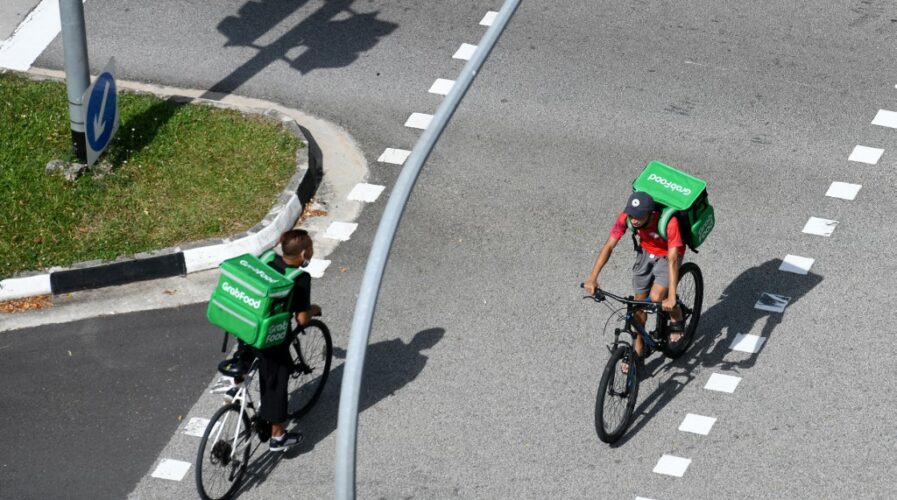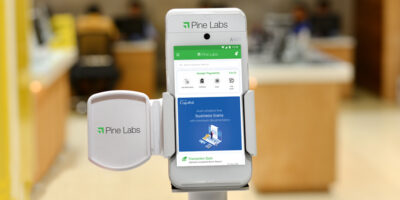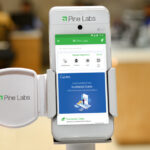
Grab delivery cyclists ride past each other in Singapore on April 20, 2020. (Photo by ROSLAN RAHMAN / AFP)
BNPL now accessible to many more merchants through GrabPay
- The partnership will allow more SEA merchants to offer customers PayLater options
- With PayLater, e-Tailer Zalora saw an increase in shopper conversion and basket sizes
BNPL (buy now pay later) has been seeing increased demand amongst customers in recent months, although enabling such options for merchants was previously limited.
Recently, Grab announced a stronger partnership with payments platform Adyen to enable BNPL facilities for merchants. Starting in Singapore and Malaysia, merchants can offer Grab’s PayLater service to serve a growing customer base looking for deferred payment methods.
Available through the GrabPay wallet, merchants will now be able to offer PayLater payment methods during the checkout stage, allowing customers to purchase what they want and pay for it later without interest.
Customers will be able to choose between interest-free payments over four installments (PayLater installments), or the following month (PayLater Postpaid).
Increased customers common with BNPL-enabled merchants
In May this year, Southeast Asian e-Commerce fashion platform Zalora introduced this deferred payment method through Adyen. The company reported a 20% increase in new shoppers and a 15% increase in users using GrabPay to complete a purchase.
The online retailer has also seen an increase in sales as shoppers who used Grab PayLater had larger basket sizes, compared to those who used Grab Wallets. Zalora reported that in Malaysia, basket sizes were 32% larger, whereas, in Singapore, they were 12% larger.
“When it comes to online purchases, shoppers want secure, convenient, and frictionless checkout experiences. The PayLater option by Grab ticks all those boxes, while also enabling us to give our customers more flexibility to choose from their preferred payment methods.
“Not to mention, by having all our payments on a single platform via Adyen, we have a single source of truth for data, can scale easily, and track all transactions in one portal”, said Kannan Rajaratnam, Director of Payments, Zalora.
“We expanded our partnership with Adyen to offer PayLater to businesses, starting in Singapore and Malaysia, as many of our merchants are already integrated with Adyen via their existing APIs.
“This means they can now easily add deferred payment methods as another flexible option for their customers, at no extra cost,” said Chris Yeo, Managing Director and Head of GrabPay, Grab Financial Group.
“Buy Now, Pay Later options are becoming more popular in Asia, and we see demand growing. This partnership gives our merchants the ability to offer this payment method, so their shoppers have more flexibility in paying for their purchases via their preferred payment approach,” said Warren Hayashi, President of Asia-Pacific, Adyen.
Grab and Adyen have been partners since 2016 when the super-app first selected Adyen to extend its GrabPay capabilities across Southeast Asia.
The concept may be popular, but critics warn of risks
BNPL isn’t entirely new — it’s been around since last year and has made its mark across various countries in Southeast Asia, and Australia. Earlier this month, Apple announced a collaboration with Goldman Sachs to offer this service to their customers as well.
However, whilst consumer demand for BNPL grows, many have warned that it would be a ‘debt trap’ — Malaysian personal finance expert Suraya Zainuddin (of RinggitOhRinggit) is a vocal critic of the concept.
Her main criticisms include that these payment providers target the debt market without needing proof of recurring income and the financial ability to pay back, as well as luring customers into purchasing things they cannot otherwise afford, on credit.
According to a 2017 article in the New Straits Times, only 43.6% of Malaysian credit card users pay their balance in full — and these are the consumers who are supposed to be ‘credit-worthy’.
READ MORE
- The criticality of endpoint management in cybersecurity and operations
- Ethical AI: The renewed importance of safeguarding data and customer privacy in Generative AI applications
- How Japan balances AI-driven opportunities with cybersecurity needs
- Deploying SASE: Benchmarking your approach
- Insurance everywhere all at once: the digital transformation of the APAC insurance industry


